Owners' Advice
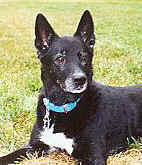



Always under Construction....
This part of our site contains advice that VHUP Oncology clients shared in response to questions.
We wanted to know:
- What is the most important advice you would give an owner considering whether to treat a pet, or someone who is struggling in the early phases of treatment?
- What has been the hardest part of treatment for you/your family?
- What has been the hardest part of treatment for your pet?
- In hindsight, do you think the treatment you sought for your pet was worthwhile? Knowing what you know today, what, if anything would you do differently in seeking treatment?
- What has your pet’s quality of life been like during treatment (generally good, generally difficult, some good/some bad)?
- What is the funniest thing your pet has done while in treatment?
- How long has your pet been in treatment? If your pet has died, what was the cause of death (the cancer, cancer related issues, or unrelated)?
Owners' Advice
1. What is the most important advice you would give an owner considering whether to treat a pet, or someone who is struggling in the early phases of treatment?Consider the pet's quality of life (Anna and Leonard, Lucy - dog, lymphoma, 7 at diagnosis)
Only the pet's quality of life is important. You have to be the great friend they are for you. Treat them for themselves, not for you. (Isabelle, Canaille - dog, malignant tumor (melanoma), 9)
Remember it’s about them, not what you want. Know your pet, how do they seem, their quality of life. Talk to their doctor, ask questions, and don’t be afraid to really listen to what they say. (Shona, Bobo - dog, leukemic lymphoma, almost 15)
When you purchase a pet for your family, you now have a new member. You have made a promise to keep that animal as healthy and happy as can be. As yourself a few questions -- would your pet get you the best treatment? And where else can you find someone who loves you unconditionally? (Marie, Elmo - dog, lymphosarcoma, 5)
We would advise anyone who is considering treatment for their pet to consider that they are in this for the long haul and to ask themselves ... are they willing to spend the money and invest the time ... not knowing how well things will work out for their pet? Success varies. In our case, we were told the cost would be around $3,000 for Kirby's protocol. This cost estimate was based on what is considered normal longevity from the treatment. Generally, on the high side ... 10 to 12 months. The greater the success, the longer the longevity and the more it ends up costing. I would have to say, Kirby was a success story and our costs overall went far beyond $20,000. Then, once you make that decision to go ahead with treatment always communicate to your doctor any little thing that you notice with your pet, that might be related to the treatment, or the cancer itself. You never know what is normal and what is not. (Ken and Fran, Kirby - dog, lymphosarcoma, 4 1/2)
Give the pet a lot of love. Ask yourself whether they would benefit without suffering very much. (Terri, Jake - cat, gastro-intestinal lymphoma, 12)
The ages and vitality of the pet is important. If the pet is like our Jessie, likes going for chemo, and the attention she gets - that's a help. (Nora, Jessie, 5 1/2)
Consider the health, well-being, and ultimate prognosis of your pet first, and your emotional needs second (Nick, Koby - cat, lymphoma, 12)
Seek treatment! Realize the first few months are hard -- you don't know what to expect from week to week, but things will get better. (Pat, Hannah - cat, lymphosarcoma, 4)
Within reason, be patient. Yapper had a strong reaction to the chemotherapy for about three weeks. Then it got much better. (Gina, Yapper - cat, lymphoma, 18+)
Keep asking questions of the vets. One may not answers your question sufficiently, while another will be able to do so. (Jacque, Metisse - cat, nasal lymphoma, 14)
[Use] the support line in order to learn from others that have been through it. This experience is invaluable. (Jeff, Megan - dog, hemangiosarcoma and lymphoma, 10)
If their pet is strong enough, please try treatment. (Gail, Maggie - dog, lymphoma, 9 1/2)




2. What has been the hardest part of treatment for you/your family?
The roller-coaster effect of responding to treatment. (Anna and Leonard, Lucy - dog, lymphoma, 7 at diagnosis)
When he had a stricture and stopped eating. Doubt came back - "Did I do the right choice?" (Isabelle, Canaille - dog, malignant tumor (melanoma), 9)
Watching Elmo get sick and be nonactive. (Marie, Elmo - dog, lymphosarcoma, 5)
Watching our cats health decline - weight loss, loss of appetite, and not being able to do very much about it. The high cost of treatment. (Terri, Jake - cat, gastro-intestinal lymphoma, 12)
The uncertainty of how much time we had left with her. (Nick, Koby - cat, lymphoma, 12)
Knowing it is only a temporary solution. (Pat, Hannah - cat, lymphosarcoma, 4)
Knowing that she wouldn't be "cured" - the best we could expect was a lengthy remission. (Nora, Jessie, 5 1/2)
Acclimating to the routine; waiting for the results of first scan post chemo.. (Gina, Yapper - cat, lymphoma, 18+)
Trying to keep him eating. Trying all kinds of cat good, raw liver, cooked liver, anything to get him to eat several times a day. (Jacque, Metisse - cat, nasal lymphoma, 14)
Ongoing treatment for Meg with no complete cure. Actually going through it. (Jeff, Megan - dog, hemangiosarcoma and lymphoma, 10)
The drive into the City. (Gail, Maggie - dog, lymphoma, 9 1/2)
The initial reaction to vincristine early in his treatment and the last two months of his life, when we knew his health was declining, but could not determine why. (Carol, Berry, dog, lymphoma, 3 1/2)
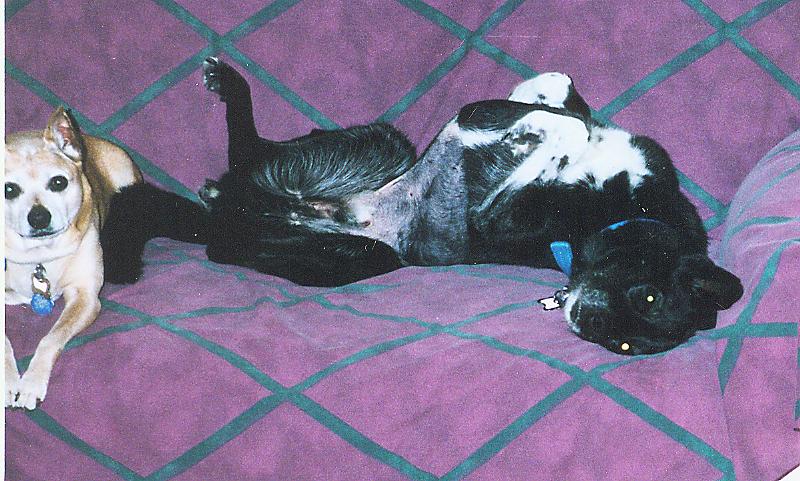
3. What has been the hardest part of treatment for your pet?
Occasional vomiting and diarrhea. Going to the hospital. (Anna and Leonard, Lucy - dog, lymphoma, 7 at diagnosis)
Chemotherapy and surgery (before and after relapse). (Isabelle, Canaille - dog, malignant tumor (melanoma), 9)
Getting sick for chemo. (Marie, Elmo - dog, lymphosarcoma, 5)
Bringing him in for treatment. (Terri, Jake - cat, gastro-intestinal lymphoma, 12)
Some bouts of diahrrea from certain chemo protocols. (Nora, Jessie, 5 1/2)
Weight loss. (Nick, Koby - cat, lymphoma, 12)
Appetite (at times). Mainly, she has done very well!. (Pat, Hannah - cat, lymphosarcoma, 4)
His appetite went up and down so it was sometimes a struggle to get him to eat. (Gina, Yapper - cat, lymphoma, 18+)
The reaction to the first vincristine treatment, before we got metaclopramide for the side effects. (Carol, Berry, dog, lymphoma, 3 1/2)
Nausea after I.V. treatment. Unable/unwilling to east after for several days. (Jacque, Metisse - cat, nasal lymphoma, 14)
Sometimes the nausea for Meg, the lethargy, but seems to be in control now. (Jeff, Megan - dog, hemangiosarcoma and lymphoma, 10)
The long drive and Maggie sometimes being wiped out for a few days after treatment. (Gail, Maggie - dog, lymphoma, 9 1/2)
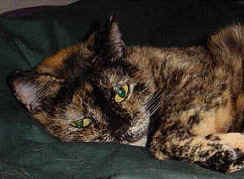

4. In hindsight, do you think the treatment you sought for your pet was worthwhile? Knowing what you know today, what, if anything, would you do differently in seeking treatment?
Absolutely nothing. (Pat, Hannah - cat, lymphosarcoma (4 at diagnosis))
Yes, I think UPenn was the right choice. Don't think I would have done anything differently. (Nora, Jessie, 5 1/2)
It was worthwhile. No regrets. (Anna and Leonard, Lucy - dog, lymphoma, 7)
Yes, we were told Elmo was in the late stages of cancer and would probably only last about 6 months. Elmo lasted a total of 19 months. (Marie, Elmo - dog, lymphosarcoma, 5)
There is no doubt that the treatment for Kirby was worthwhile. Not only for him personally, but for us too. Because of the treatment, we were fortunate to have Kirby for 5 additional years than we would have if we chose not to have the treatments for him. And ... they were 5 "quality" years, which is what we were looking for him to have. Quantity ... without quality ... is meaningless. After the fact, now knowing what the overall cost for us was (mid $20,000 range) ... how many trips we made to the University of Penna. Vet Hospital with Kirby (76) ... and the additional time we were blessed to have Kirby (5 extra years) ... beyond any doubt, we'd do it all over again. No question about it!!! I can not think of anything off the top of my head that we'd consider doing differently. (Ken and Fran, Kirby - dog, lymphosarcoma, 4 1/2)
Definitely. Without treatment, our cat would not be alive today (still purring). (Terri, Jake - cat, gastro-intestinal lymphoma, 12)
Definitely worthwhile. I would do the same. (Nick, Koby - cat, lymphoma, 12)
Absolutely! Considering his age and the size of the tumor when he was diagnosed - his survival for 8 months (of which 7.5 were great quality) was wonderful. (Gina, Yapper - cat, lymphoma, 18+)
Yes!!! It has been just over a year since starting treatment and he is doing GREAT. (Jacque, Metisse - cat, nasal lymphoma, 14)
Yes! Absolutely I would do nothing different. (Jeff, Megan - dog, hemangiosarcoma and lymphoma, 10)
Canaille is doing great and I think it was worthwhile. The only change would be when I first saw the tumor, I asked my local vet what to think and he took off the tumor [but] not completely. If I had to do it again I would come directly here at the Vet School. (Isabelle, Canaille - dog, malignant tumor (melanoma), 9)
YES!! I wasted too much time with my regular vet waiting for appointments and results. Next time I'm coming right down here. (Gail, Maggie - dog, lymphoma, 9 1/2)



5. What has your pet’s quality of life been like during treatment (generally good, generally difficult, some good/some bad)?
Generally good (Anna and Leonard, Lucy - dog, lymphoma, 7)
Some times very bad but now he is like five and you wouldn't say he went through all that. (Isabelle, Canaille - dog, malignant tumor (melanoma), 9)
The quality of life from diagnosis in October 2005 until approximately 1 month before she died in January 2008 was generally good. (Nora, Jessie, lymphoma, 5 1/2)
Generally good with a few illnesses along the way (Marie, Elmo - dog, lymphosarcoma, 5)
Generally good. (Terri, Jake - cat, gastro-intestinal lymphoma, 12)
Excellent except for extreme weight loss. Koby was happy, active and loving. Even more active than before diagnosis. (Nick, Koby - cat, lymphoma, 12)
Generally good. (Pat, Hannah - cat, lymphosarcoma (4 at diagnosis))
Generally very good. (Gina, Yapper - cat, lymphoma, 18+)
The first month was the most difficult, but overall he was great. He was full of life and lived like a puppy. (Shona, Bobo - dog, lymphoma, almost 15)Very good. People could believe he had cancer. (Carol, Berry, dog, lymphoma, 3 1/2)
Some good/some bad. Just trying to keep him eating. (Jacque, Metisse - cat, nasal lymphoma, 14)
Great. She continues to act as she did when first diagnosed. (Jeff, Megan - dog, hemangiosarcoma and lymphoma, 10)
Generally good to excellent! (Gail, Maggie - dog, lymphoma, 9 1/2)
Kirby's quality of life during all his treatments was generally good. At times, he'd be a little sluggish and his appetite wasn't up to par for maybe one day afterwards. It's possible he handled his treatments so well because of his large size. If it wasn't for him having his fur shaved in spots, at times ... if we didn't tell you his situation, you wouldn't notice him acting any differently than he usually did. All animals may not and some do not handle the treatment as well as Kirby basically did. (Ken and Fran, Kirby - dog, lymphoma, 4 1/2),
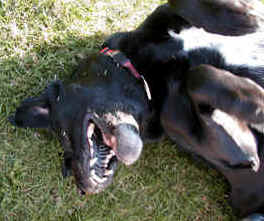


6. What is the funniest thing your pet has done while in treatment?
Eat the Oncology Team's lunch leftovers out of the trash! (Anna and Leonard, Lucy - dog, lymphoma, 7)
She became the "Cookie Monster" of Oncology, lining up for treats after her treatment or any other dog's treatment. (Nora, Jessie, lymphoma, 5 1/2)
When he started to feel better, he was so happy to enjoy life that he wanted to stand between my legs even when I was walking, as if saying "I'm back, I'm back!" (Isabelle, Canaille - dog, malignant tumor (melanoma), 9)
Elmo was always doing goofy things. (Marie, Elmo - dog, lymphosarcoma, 5)
He would get into these "Wonder Doggy" moods, he would run like a race dog and terrorize his buddy "Sarge". He also had a favorite teddy bear, he would carry it like a mother dog, he would act out if it wasn’t in his sight. We would bring his "baby" to the hospital. (Shona, Bobo - dog, lymphoma, almost 15)
Jake is very expressive. (Terri, Jake - cat, gastro-intestinal lymphoma, 12)
I don't know if we would say it was a funny thing, but we believe Kirby fell in love with Dr. Baez. He looked at her with that love lorn look and would follow her around, into her office and lay down beside her while she worked at her desk. If she left the room he was in upstairs, he'd get up, stick his head out the door and watch her go down the hall ... sometimes leaving to follow her. We feel Dr. Baez and Kirby had a special relationship. (Ken and Fran, Kirby - dog, lymphoma, 4 1/2),
Sometimes she got so excited she would lick the walls. (Nick, Koby - cat, lymphoma, 12)
Lost whiskers on one side (Pat, Hannah - cat, lymphosarcoma, 4)
I hear she sings for everyone [in Oncology]. She always wanted to be a diva -- ha! (Jeff, Megan - dog, hemangiosarcoma and lymphoma, 10)
Berry couldn't resist anything soft and fluffy. One day, when Roxanne and Berry were in the VHUP elevator coming down from the Oncology area, a woman with a furry red purse got into the elevator. The next thing they knew, Berry had snatched the purse and sprinted off with his prize. (Carol, Berry, dog, lymphoma, 3 1/2)
Maggie and I have to share a peanut butter and jelly sandwich on our way home. When we're done, she sleeps all the way home. (Gail, Maggie - dog, lymphoma, 9 1/2)
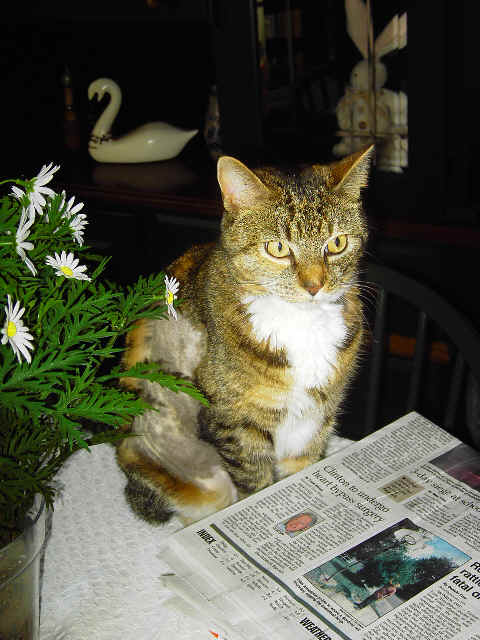
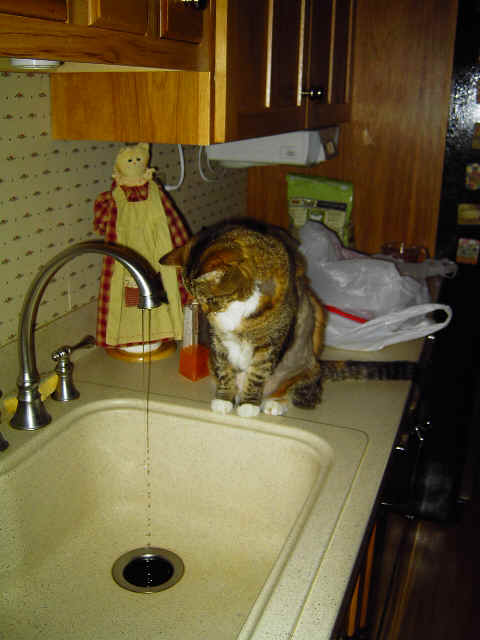
Lost whiskers on one side (Pat, Hannah - cat, lymphosarcoma, 4) (We think Hannah has been up to some other tricks, too - she tells us the newspaper article says "Clinton to undergo heart bypass surgery" and she also seems to be involved in hydraulic engineering. - dogdoggiedog)
7. How long has your pet been in treatment? If your pet has died, what was the cause of death (the cancer, cancer related issues, or unrelated)?
In treatment 3.5 months. Cause of death: the cancer. (Anna and Leonard, Lucy - dog, lymphoma, 7 at diagnosis)
October 2005-January 2008. Cause of death: Cancer-related issues. Died suddenly after an apparent heart attack. (Nora, Jessie, dog, 5 1/2)
In treatment one year, followed by one year of check ups. (Isabelle, Canaille - dog, malignant tumor (melanoma), 9)
In treatment one year. Cause of death: the cancer . (Shona, Bobo - dog, leukemic lymphoma, almost 15)
In treatment 19 months. Cause of death: the cancer. The cancer got him in the end. Elmo was a fighter to the end. (Marie, Elmo - dog, lymphosarcoma, 5)
In treatment since April 2004. (Terri, Jake - cat, gastro-intestinal lymphoma, 12)
In treatment 3 years, 8 months. Cause of death: other cancers. (Carol, Berry, dog, lymphoma, 3 1/2)
In treatment 3 months. Cause of death: the cancer. Koby was euthanized when her cancer came out of remission and her blast count spiked. (Nick, Koby - cat, lymphoma, 12)
In treatment since fall 2004. (Pat, Hannah - cat, lymphosarcoma, 4)
In treatment 8 months. Cause of death: Cancer plus other complications. He was very old. (Gina, Yapper - cat, lymphoma, 18+)
In treatment since March 17, 2004. (Jacque, Metisse - cat, nasal lymphoma, 14)
In treatment 3 1/2 years for three forms - Still Kickin' and Lovin' Life. (Jeff, Megan - dog, hemangiosarcoma and lymphoma, 10)
In treatment 14 months. (Gail, Maggie - dog, lymphoma, 9 1/2)
* * * * * * * * * *
Click here to go to the Pets with Cancer main page